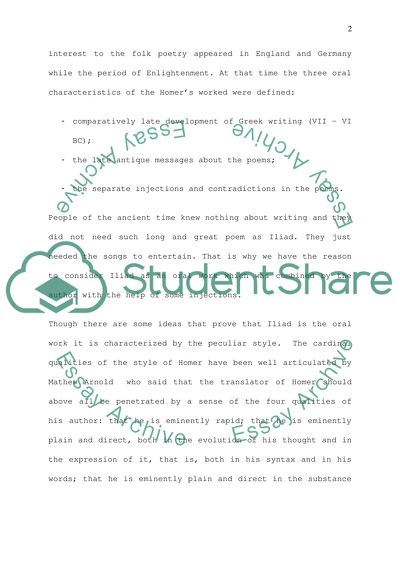Cite this document
(“Consider The Iliad by Homer as an oral work. Explain some of its oral Essay”, n.d.)
Consider The Iliad by Homer as an oral work. Explain some of its oral Essay. Retrieved from https://studentshare.org/miscellaneous/1537897-consider-the-iliad-by-homer-as-an-oral-work-explain-some-of-its-oral-characteristics-and-consider-how-they-work-for-an-audience-andor-the-role-they-play-in-th
Consider The Iliad by Homer as an oral work. Explain some of its oral Essay. Retrieved from https://studentshare.org/miscellaneous/1537897-consider-the-iliad-by-homer-as-an-oral-work-explain-some-of-its-oral-characteristics-and-consider-how-they-work-for-an-audience-andor-the-role-they-play-in-th
(Consider The Iliad by Homer As an Oral Work. Explain Some of Its Oral Essay)
Consider The Iliad by Homer As an Oral Work. Explain Some of Its Oral Essay. https://studentshare.org/miscellaneous/1537897-consider-the-iliad-by-homer-as-an-oral-work-explain-some-of-its-oral-characteristics-and-consider-how-they-work-for-an-audience-andor-the-role-they-play-in-th.
Consider The Iliad by Homer As an Oral Work. Explain Some of Its Oral Essay. https://studentshare.org/miscellaneous/1537897-consider-the-iliad-by-homer-as-an-oral-work-explain-some-of-its-oral-characteristics-and-consider-how-they-work-for-an-audience-andor-the-role-they-play-in-th.
“Consider The Iliad by Homer As an Oral Work. Explain Some of Its Oral Essay”, n.d. https://studentshare.org/miscellaneous/1537897-consider-the-iliad-by-homer-as-an-oral-work-explain-some-of-its-oral-characteristics-and-consider-how-they-work-for-an-audience-andor-the-role-they-play-in-th.


